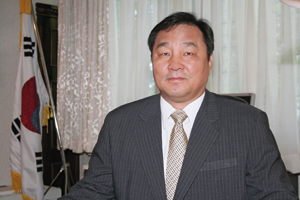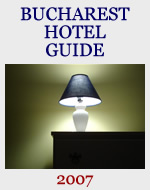Potential for a bridgehead
For Koreans, Romania is the best entry point to Europe, but setting up a new investment still faces obstacles,
finds Ana-Maria Nitoi
 |
|
|||||||||||||
In South Korea, Romania is regarded as the best gateway to Europe, while the Asian country could be considered a bridgehead for Romanians in the Far East, argues the Ambassador of South Korea to Bucharest Choi Ihl-song.
South Korea was quick to realise the significance of Romania’s heavy industry in the 1990s, with significant investments from the industrial conglomerate Daewoo in the shipbuilding industry of Mangalia and in Craiova’s car industry.
While the shipbuilder is still active on the Black Sea coast, the Daewoo car factory entered into the hands of the state when the Korean vehicle brand was taken over by General Motors. Last year the plant was bought out by Ford Motor Company.
Since January 2007 no new South Korean company has invested in Romania, but those remaining in the country have consolidated their presence. Stainless steel products manufacturer Samsung Otelinox is investing in its third production facility in Targoviste, Dambovita county, while Bucharest-based heavy machines manufacturer Doosan IMGB pledges almost 40 million Euro this year alone. Meanwhile shipyard Daewoo Mangalia has been expanding its facilities by investing 34 million Euro last year and about 68 million Euro in 2008.
But Korean companies face tough challenges in Romania. A company producing LCD TVs and monitors for Samsung Electronics is now trying to set up a 30 million Euro manufacturing complex near Oradea, Bihor county, at the border with Hungary. On the European LCD market, Samsung Electronics’s market share is over 20 per cent and rising. The South Korean company is looking for a new production site close to its facilities in Hungary. But after searching for over a year in Bihor county, the firm has failed to find a suitable site. “Due to the high bureaucracy in Bihor county and Oradea city, Samsung is facing strong difficulties in doing business in Romania,” says the first secretary of the Embassy and consul Kim Chang-nyun. This investment is a significant test case, because its success could attract other investments from Samsung.
The Ambassador says that Korean construction companies and one major car parts manufacturer are also prospecting the local market. “Most Korean enterprises operating here or considering to advance in this country mention the problem of infrastructure, as they target mainly the European market for which efficiency in transportation is one of the key factors for their business success,” Choi Ihl-song adds.
Narrowing trade gap
The first secretary of the Embassy Kim Chang-nyun believes the electronics industry would be the best business opportunity in this country as Romanians have strong skills in science and mathematics. Heavy industry, including steel-making, is another promising sector.
Trade is heavily in Korea’s favour, although this gap is narrowing. Korean statistics show that in 2007 the bilateral trade volume reached 633 million Euro, of which 582 million Euro is Korean exports to Romania. The situation is improving for Romania. In the first six months of this year, Romanian exports to South Korea increased by almost four times to 81.7 million Euro, compared to the same period last year.
In Romania, the Korean ex-pat community numbers around 300, most of whom are businessmen living here with their families. There are also around 20 Korean Christian missionaries. Romanians residing in South Korea number around 450. From this, around 180 have been sent on job training by the Romanian subsidiaries of Korean companies. The others are engaged in trade, working in amusement parks or studying. Many Romanian women are also married to Korean men.
Samsung Otelinox: kicking off 55 million Euro factory
Last spring stainless steel products manufacturer Samsung Otelinox began a 55 million Euro investment in a new production facility for high precision flat products in Targoviste, Dambovita county, which will become operational in 2010.
At the new factory, the company will produce annually 30,000 tonnes of stainless steel straps of a 1.0 to 1.5 mm thickness.
This will contribute to a total sales volume of 80,000 tonnes for the entire range of flat stainless products, according to Adrian Glavan, general manager of Otelinox.
The company also has a further production unit for thin stainless straps, which opened in 2002 and a facility for the production of stainless steel pipes, which has been operational since 2006.
Last year Otelinox was hit by a fluctuation in the global price of nickel and by competition from China, Taiwan and India of imported stainless steel products. “The situation improved at the end of 2007 when the nickel price became more stable and the Asian imports were subject to more strict regulations,” says Glavan.
Samsung Otelinox
Stainless steel products manufacturer
■ #2007 profit: 2.2 million Euro
■ #2007 turnover: +50 million Euro
■ 2008 forecast turnover: 70 million Euro
■ Employees: 880
LG Electronics: 50 per cent rise in sales for first half of year
A boom in purchasing power has prompted television-addicted Romanians to buy up new LCDs and plasma screens, with wide-screen monitors becoming the highest in demand among electronics, according to LG Electronics Romania.
The Korean group has recorded a 52 per cent growth in sales revenue in the first half of 2008 on the previous year. “We are expecting this year’s sales will grow in many product categories, with a spectacular increase in our sales of LCD TVs, air-conditioners and mobile phone handsets,” says Han Kyu, general manager of LG Electronics Romania.
However macroeconomic factors and local regulations could decelerate this rise in sales of electronics, argues Kyu. High interest rates and new policies from the central bank which limit consumer credit, as well as the soaring price of crude oil, could cause a slow down in sales for the rest of the year.
In 2008 LG increased its supply of LCD TVs due to greater demand for this segment and also introduced its smallest plasma TV (32-inch) on the market.
LG Electronics Romania:
Electronic goods
■ 2007 turnover: 104 million Euro
■ 2008 forecast turnover: 140 million Euro
■ Employees: 60
Doosan IMGB: planning to double capacity in 2008
In 2006 Doosan Heavy Industries bought southern Bucharest heavy machinery manufacturer IMGB from UK-based TH Global with the aim to become the number one caster and forger in Europe.
“We have been performing large investments and technology transfer on schedule to achieve this purpose,” says the general manager of Doosan IMGB Jeog Jeon.
Since 2006, the company has increased its production capacity and sales on the European market. Last year, Doosan IMGB produced 25,000 tons in forgings, but plans to double its capacity this year.
“Considering Romania’s high potential in the power, shipbuilding, petrochemical and car sectors, the demand for casting and forging, mould steel and ingot will continue increasing,” Jeog Jeon says.
About 95 per cent of its production is exported mainly to North-East Asia including South Korea, China and Japan, as well to Europe.
But the lack of proper infrastructure in Romania and the worker shortfall, plus the rising labour costs is tough for a company employing almost 800 people. In the last two years, worker costs at IMGB increased by 20 per cent.Since the collapse of Communism, heavy industry in Romania as a proportion of GDP has fallen dramatically, with many state firms closing without a potential buyer. This has affected the supply chain for large-scale factories. “We have strong difficulties in finding Romanian companies in this sector to supply us with different goods and we have to import an important part from abroad,” says Jeog Jeon. He adds that this makes business more expensive, complicated and time-consuming.
Another goal for the company is to finish by the end of 2008 the work on a seven million Euro Fume and Gas Treatment Plant, which should have a strong impact on reducing pollution.
Doosan IMGB
Casting and forging
■ 2007 investments: 12.3 million Euro
■ 2008 forecast investments: 36.9 million Euro
■ 2009 forecast investments: 16.7 million Euro
■ 2007 turnover: 52 million Euro
■ 2008 forecast turnover: 70 million Euro
■ Employees: 762
Daewoo Mangalia: using internationals and Romanians returning in hire drive
Daewoo Mangalia Heavy Industries (DMHI) is pledging to remain in Romania to produce its niche ship industry vehicles and targets a sales volume of approximately 340 million Euro in 2009 and 675 million Euro in 2012. The Koreans have also bought land to build new facilities to support the new orders, increasing its estate by 16 per cent to 165,000 sqm, this is all despite losses last year of around 21.1 million Euro.
But shipyards in Romania are facing stormy waters as skilled workers continue to migrate abroad for better pay packets. To cover the capacity of its large orders, DMHI is employing workers from China, Vietnam, the Republic of Moldova and soon from Sri Lanka. “In the meantime, at the beginning of the year we started a very strong hiring campaign and even ex-employees who decided last year to leave the company for other jobs in the EU now are coming back for rehiring,” says Yong Duk Park, DMHI’s executive director and CMO.
DMHI builds and sells Capesize Bulkcarriers and Post-Panamax Containerships for German and Greek companies such as Hamburg Sud of Oetker Group and Greece’s Tsakos Shipping and Trading. With eight Capesize Bulkcarriers and 21 Post-Panamax Containerships on its orderbook, DMHI ranks first in Europe on this niche market, according to Clarksons Shipping Intelligence Network. Over 97 per cent of the Romanian shipbuilding and repair industry is exported. “Lack of domestic demand and financial support have been the main driving issues for exclusive export orientation of the Romanian shipbuilding industry,” says Yong Duk Park.
Daewoo Mangalia Heavy Industries
Part of Daewoo Shipbuilding Marine Engineering
Shipbuilding and ship repair industry
■ Builds and sells Capesize Bulkcarriers and Post-Panamax Containerships
■ 2007 turnover: 393.6 million Euro
■ 2007 losses: 21.1 million Euro
■ Employees: 3,810
Hyundai: planning up to 26 new complexes for 2008
For 2008, distributor Hyundai Auto Romania plans to continue developing its network by opening up to 26 new Hyundai 3S complexes, each including a showroom, a car shop and a storage facility for parts and accessories.
So far the firm’s results in the SUV segment in 2008 have been good, registering over a 32 per cent market share, led by the Tucson and Santa Fe models.
“Staying leader in the SUV segment since 2005, with very fierce competition from traditional SUV car manufacturers, was the most difficult challenge while doing business in this sector,” says the general manager of Hyundai Auto Romania, Narcis Ghita.
Meanwhile the Hyundai i30, Hyundai Accent and Hyundai i10 are among the company’s best sold models across all categories this year.
Compared to western European clients, the Romanian customer is emotional and concerned more on status and position in society than practicality, says the general manager. When buying a car, Romanians are also guided by price, special offers and brand, but not necessarily in that order.
This year Hyundai Auto Romania is launching seven new products of which two, Hyundai i20 in the B segment and the Hyundai Veracruz SUV, will be available this autumn.
Hyundai Auto Romania
■ Ranking in sector: sixth
■ Market share: 6.1 per cent in the first six months of 2008
■ Number of units sold in 2007: 13,000
■ Predicted number of units sold in 2008: up to 16,000
■ 2007 turnover: 188 million Euro
■ 2008 forecast turnover: 216 million Euro
■ Network: 39 dealers, 68 showrooms and 31 car shops
Canal Teleshop: building on Romanian appetite for buying through TV
Romania’s exclusive teleshopping TV station Canal Teleshop has shown Romanian consumers are hungry for buying cosmetics, kitchenware and innovative household items through the television. Now the Korean-owned TV station is working on opening a TV station in the Moldavia region.
The most difficult challenge for Canal Teleshop has been to convince Romanian viewers to make the move from the TV to the phone and make the purchase. “It was hard, but given our rate of returning customers - over 30 per cent - we consider that we are going on a successful path,” says Lavinia Choi, general manager at Canal Teleshop.
The company plans to see an increase of around 25 per cent in turnover for 2008 to 1.06 million Euro. “Our development in the last years showed that this is a market that grows continuously and constantly and our role is to also educate the consumer and the market,” adds Choi.
Canal Teleshop
Teleshopping TV station
■ 2007 turnover: 0.84 million Euro
■ 2008 forecast turnover: 1.06 million Euro
■ Employees: 17
Interviews by Ana-Maria Nitoi and Corina Ilie

















